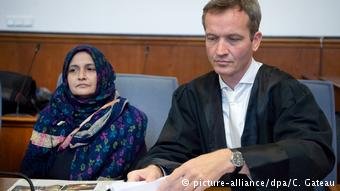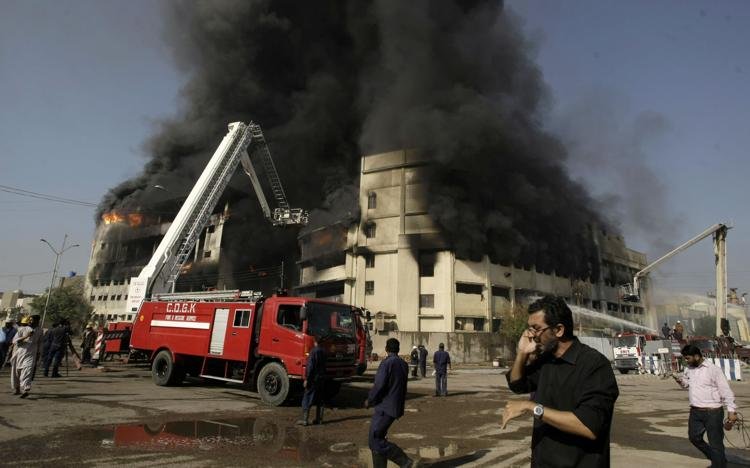A German court has rejected a lawsuit from Pakistanis against German retailer KiK over responsibility for a factory fire in Karachi. KiK said the blaze was an act of terrorism. Shamil Shams reports from Dortmund.
DW
BERLIN
 A German regional court in Dortmund on Thursday ruled against four Pakistanis who had sued the German discount clothing retailer KiK for €30,000 ($34,500) each. The plaintiffs said the company should have provided them compensation for the pain they suffered and the death of their family members in a 2012 fire at a clothing factory in Karachi that killed more than 250 people.
A German regional court in Dortmund on Thursday ruled against four Pakistanis who had sued the German discount clothing retailer KiK for €30,000 ($34,500) each. The plaintiffs said the company should have provided them compensation for the pain they suffered and the death of their family members in a 2012 fire at a clothing factory in Karachi that killed more than 250 people.
Saeeda Khatoon, a Pakistani mother, along with Muhammad Jabir and Abdul Aziz Khan, all lost their sons to the fire. Another plaintiff, Muhammad Hanif, is himself a survivor.
“I am very sad that our voice was not heard by the court. We lost our children in the 2012 factory fire. It seems that nobody cares for the poor workers. It was a decision in favor of the companies. But I will not stop my fight for our rights,” Khatoon told DW.
The Dortmund court decided that under Pakistani law, the statute of limitations for the victims’ right to compensation had expired.
“We are disappointed because we still believe that under Pakistani law, the statute of limitations was interrupted, which means that the case is not time-barred under Pakistani law,” Miriam Saage-Maass, a lawyer for the Pakistani plaintiffs, told DW after the hearing concluded.
Gunther Lehleiter, an attorney representing KiK, told DW that the decision was a “sound ruling” because the fire was a “terrorist incident” and did not result from the factory being in poor condition.
The lawsuit raised the question of whether retailers of cheap clothing could be held accountable for accidents that occur in subcontracted production centers located in developing countries that ostensibly lack safety standards.
The Karachi factory reportedly had only one exit along with barred windows that prevented escape in the event of an emergency. Another one of the plaintiffs’ lawyers, Remo Klinger, said before the hearing that KiK had neglected fire safety regulations and hence shared responsibility for the high number of casualties.
Nine people in Pakistan are also reportedly being sued for the fire that broke out at the Ali Enterprises factory in Karachi on September 11, 2012, after a Pakistani investigation claimed that the fire was an arson attack carried out by a local political party.
Initially, KiK established a $500,000 emergency fund to support victims’ families, and was even considering doubling the amount. But it backed out from its promise after the arson accusations emerged.
“KiK didn’t cause the fire in the factory and hence doesn’t have to pay pain and suffering damages — we’re not talking about a cable fire or an electrical short circuit, but a planned attack,” the company said.
Regardless of culpability, the factory blaze was able to spread quickly partly because factory owners blatantly violated safety standards, and the emergency exits were blocked or even locked. The incident was dubbed Pakistan’s “industrial 9/11.”
“The question of liability has not been addressed, which is very regrettable,” said Saage-Maass, adding that, however, the debate on supply chain liability in Germany and in Europe has been “seriously advanced.”
Nasir Mansoor, general secretary of the National Trade Union Federation in Pakistan, told DW that the “struggle to hold international companies responsible for the situation of workers in our countries will continue.”
A German court won’t take up a civil case against a discount textile company whose clothes were produced in a factory in Pakistan that burned to the ground in 2012, killing more than 250 people.
The Dortmund regional court ruled Thursday that the statute of limitations had expired on the suit brought by four Pakistani plaintiffs — a survivor and three relatives.
A German court on Thursday threw out a lawsuit by Pakistani plaintiffs against clothing retailer KiK over a deadly 2012 fire at a Karachi garment factory, saying the statute of limitations had expired.
The blaze at the Ali Enterprises factory, which was started deliberately, killed 258 people in one of Pakistan’s worst industrial disasters.
A survivor and three relatives of victims had sought damages for pain and suffering from KiK of 30,000 euros ($34,600) each.
They argued that, although KiK did not cause the fire, it shared blame for a lack of safety measures at the factory.
But a spokesperson for the regional court in Dortmund said judges agreed with a court-appointed expert’s finding that the civil suit was not filed within the applicable two-year period.
The European Center for Constitutional and Human Rights (ECCHR), a Berlin-based rights group supporting the plaintiffs, said it was considering appealing the ruling.
“KiK was the factory’s main customer and therefore bears some of the responsibility for the inadequate fire safety measures,” lawyer Remo Klinger, who represented the plaintiffs, said in a statement.
KiK, which has paid over $6.0 million in compensation to survivors and victims’ families, has rejected liability for the fatal fire.
“KiK evades the legal responsibility for the death of 258 people, but at least a German court was willing to look into the case in the first place,” said claimant Saeeda Khatoon, whose son died in the inferno.
A lack of emergency exits, fire extinguishers and clearly marked escape routes contributed to the fire’s heavy toll, according to experts cited by the ECCHR.
Several men are currently on trial in Pakistan for allegedly starting the blaze. They are suspected of being part of a criminal gang that was extorting the factory’ owners.
The fire, along with other fatal incidents at garment factories in low-wage Asian countries in recent years, has fuelled debate about the true cost of cheap, so-called fast fashion.
KiK, a household name in Germany, boasts on its website that it can dress its customers from head to toe “for less than 30 euros”.
The European Center for Constitutional and Human Rights, which supported the plaintiffs, said it is considering appealing the decision.
The plaintiffs had sought 30,000 euros ($34,000) each in damages from the KiK clothing company, arguing that as one of its main buyers the German firm was partially responsible for conditions at the Karachi factory.
KiK has rejected the accusations.–Agencies

The High Asia Herald is a member of High Asia Media Group — a window to High Asia and Central Asia

